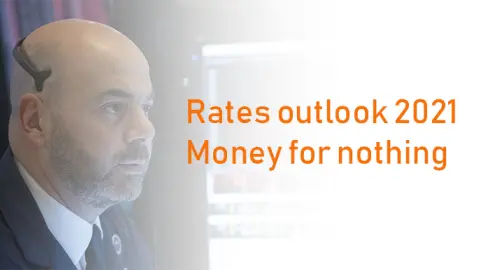EUR direction: Still constrained
We forecast 10Y EUR swap rates to rise to only 0.05% next year, equivalent to -0.25% for 10Y Germany. Inflation is going nowhere fast, ECB demand for bonds continues to grow, and fiscal stimulus is insufficient to boost long-term growth expectations
Inflation and growth: no need for (much) higher rates
It should come as no surprise that even in a period of vaccine-induced optimism, our EUR rates outlook remains heavily constrained by fundamentals, namely the very shallow path for inflation in the coming years (the ECB forecasts core inflation reaching only 1.3% in 2022). This in turn justifies no great need for higher inflation compensation further up the curve.
On the growth front, the lingering drag from higher unemployment rates and structural damage to the economic fabric of the worst affected eurozone member states still argues for depressed interest rates.
10Y swap rate to recover only slowly from its Covid slump
Demand for safe assets is still rising
On the technical front, the European Central Bank will continue removing large amounts of duration from the debt market next year. Not only will its quantitative easing (QE) portfolio growth remain positive for the whole of 2021, we expect a reduction is unlikely before 2023 at the earliest.
10Y EUR swap to rise to only 0.05% next year
We would add to this official sector demand an ever-growing pool of private sector liquidity chasing yields. A large section of this demand, for example, bank liquidity portfolios, is limited to all but the safest type of assets. This structural demand for bonds means EUR rates will fail to achieve much upward momentum in case of a recovery. It also means that if the outlook worsens, rates could easily drop below their 2020 lows (at -0.30% for 10Y swaps).
Fiscal policy better but not expansionary
Besides dealing another blow to growth and inflation expectations in Europe, the coronavirus pandemic has also brought the hope of a change in its approach to fiscal policy. A temporary suspension of the EU fiscal rules was a welcome development but did not prevent European economies from recording some of the worst growth figures worldwide.
The question investors would want to answer is, will fiscal policy become structurally expansionary beyond 2021? We wouldn’t hold our breath. Even if this were the case, assuming better long-term growth prospects on that basis is a leap of faith that we are not prepared to make.
This publication has been prepared by ING solely for information purposes irrespective of a particular user's means, financial situation or investment objectives. The information does not constitute investment recommendation, and nor is it investment, legal or tax advice or an offer or solicitation to purchase or sell any financial instrument. Read more
Tags
Rates outlookDownload
Download article
19 November 2020
Rates Outlook 2021: Money for nothing This bundle contains 12 Articles